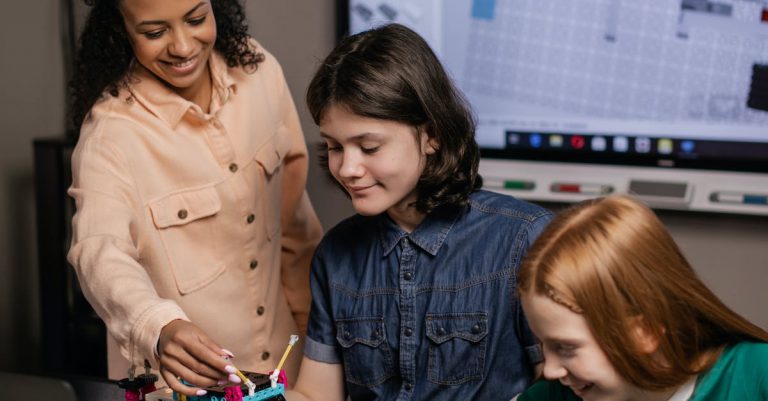Education is a crucial aspect of our lives, and the subjects we learn in school shape our understanding of the world.
Among the various subjects taught in school, there is always a debate on which one is the most important.
If you’re curious to know which subject is the most essential, keep reading.
In this article, we’ll explore the different perspectives on this topic and help you understand the significance of each subject.
Science: Understanding the natural world
Why science education is crucial
Science education is crucial for understanding the natural world and how it works. It has become increasingly important in today’s world as science and technology continue to advance. Without a basic understanding of science, it can be difficult to understand important issues such as climate change, vaccination, and the use of fossil fuels. Science education can also help students develop critical thinking and problem-solving skills, which are essential in many areas of life.
How science education helps in everyday life
Science education can help individuals make informed decisions in their everyday lives. From understanding the ingredients in the food we eat to the medications we take, science plays a crucial role. Science education can also help individuals understand the importance of conservation and the impact of human activities on the environment. It can help individuals make informed decisions about their health and wellbeing, as well as the health and wellbeing of the planet.
The importance of science in the workforce
Science education is important not only for individuals but also for the workforce. Many of today’s jobs require a basic understanding of science and technology. From healthcare to engineering, science plays a crucial role in many industries. According to the Bureau of Labor Statistics, jobs in science, technology, engineering, and mathematics (STEM) are expected to grow at a faster rate than jobs in other fields. Science education can help prepare individuals for these jobs and ensure a strong workforce for the future.
Mathematics: Building a strong foundation
The Importance of Math in Everyday Life
Mathematics is a critical subject that builds a foundation for problem-solving skills, logical reasoning, and analytical thinking. Math skills are essential for our everyday lives, from calculating the price of groceries to determining the right amount of ingredients for a recipe. A strong foundation in math also allows us to make informed decisions about personal finances, such as budgeting, saving, and investing. In addition, math skills are essential for understanding scientific concepts and advancements, such as data analysis, research, and experimentation.
How Math Skills are Essential for Various Careers
Mathematics is an essential subject for various careers, such as engineering, finance, computer science, and medicine. In these fields, math skills are crucial for problem-solving, analyzing data, and making informed decisions. For example, engineers use math to design structures and systems, while finance professionals use math to analyze stock prices and make investment decisions. Mathematicians are also in high demand to help solve complex problems in various fields, such as biology, economics, and physics.
Why Math is Crucial in Problem-Solving
Mathematics is a fundamental tool for problem-solving, and it is used to solve problems in various fields. Math skills allow us to break down complex problems into smaller, more manageable parts, and then solve them systematically. This approach is essential for analyzing data, making informed decisions, and finding solutions to complex problems. In addition, math skills are essential for critical thinking and decision-making, skills that are highly valued in the workforce and in everyday life.
Language Arts: Communication and self-expression
The significance of language in communication
Language is the cornerstone of communication. It enables us to express our thoughts and emotions to others, to share ideas, and to understand the perspectives of others. Effective communication requires a mastery of language skills such as reading, writing, speaking, and listening. In schools, language arts curriculum focuses on developing these skills to help students become proficient communicators. Through reading, students can build their vocabulary and learn about different writing styles, while writing allows them to express their thoughts and ideas in a structured and coherent manner.
The role of language arts in developing critical thinking skills
Language arts also plays a critical role in developing critical thinking skills. By analyzing and interpreting various texts, students learn to evaluate evidence, identify arguments, and draw logical conclusions. They also learn to recognize bias and propaganda, skills that are essential in today’s world of information overload. In addition, language arts helps students develop their research skills, teaching them to find and use reliable sources of information to support their arguments.
How language skills aid in self-expression and creativity
Language skills are also vital for self-expression and creativity. Through language, students can express their thoughts, feelings, and experiences in a way that is unique to them. By mastering language skills, they can communicate their ideas effectively, whether it be through writing, speech, or other forms of expression. Language arts also helps students develop their creativity by exposing them to different writing styles, genres, and literary techniques. By exploring different forms of writing, students can discover their own unique voice and style, which can help them stand out in their personal and professional lives.
Social Studies: Understanding society and culture
As a student, you may wonder what the most important subject in school is. While it’s difficult to pinpoint one subject as the most important, social studies education is undoubtedly critical. Social studies education is a subject that encompasses various fields, including history, geography, economics, and political science. Social studies education provides students with an understanding of society and culture. Here are some reasons why social studies education is critical:
Why social studies education is critical
Social studies education is critical because it teaches students about the world around them. It provides them with the skills and knowledge necessary to understand the complexities of society and culture. Social studies education also helps students develop critical thinking skills, which are essential for success in today’s world. By learning about different cultures and societies, students can develop empathy and respect for people from different backgrounds.
Additionally, social studies education helps students develop research skills. They learn how to gather and analyze information, which is a valuable skill in many different fields. Social studies education also teaches students to think critically about the information they encounter. This is particularly important in today’s era of fake news and misinformation.
How social studies education fosters global awareness
Social studies education fosters global awareness by teaching students about different cultures and societies. It provides them with an understanding of the interconnectedness of the world and helps them develop empathy for people from different backgrounds. Social studies education also teaches students about global issues such as climate change, poverty, and human rights violations. By learning about these issues, students can develop the skills and knowledge necessary to make a positive difference in the world.
Moreover, social studies education can help prepare students for careers in fields such as diplomacy, international relations, and global business. In these fields, it’s crucial to have an understanding of different cultures and societies. Social studies education can provide students with the skills and knowledge necessary to succeed in these areas.
The importance of social studies in developing citizenship skills
Social studies education is essential in developing citizenship skills. Citizenship skills are the skills necessary to be an active and engaged member of society. Social studies education teaches students about the rights and responsibilities of citizenship. It also teaches them about the democratic process and how to participate in it.
Additionally, social studies education teaches students about the importance of civic engagement. It encourages them to get involved in their communities and to make a positive difference in the world. Social studies education can also help students develop leadership skills, which are valuable in many different fields.
Physical Education: Health and wellness
Why physical education is crucial for overall health
Physical education is an essential subject in school, as it promotes physical activity and healthy living. According to the Centers for Disease Control and Prevention (CDC), regular physical activity can help reduce the risk of chronic diseases such as obesity, heart disease, and diabetes. Physical education classes provide students with the opportunity to engage in physical activity, which can lead to improved physical health, increased energy levels, and reduced stress.
In addition, physical education classes teach students about the importance of maintaining a healthy lifestyle, including proper nutrition and exercise habits. These lessons can help students develop healthy habits that can last a lifetime.
The role of physical education in developing life skills
Physical education classes not only promote physical health but also play a crucial role in developing life skills. Through physical activity, students can learn about teamwork, communication, and leadership. These skills are essential for success in both personal and professional settings.
Physical education classes also provide students with the opportunity to learn about goal setting and perseverance. Students can set fitness goals and work towards achieving them, which can teach them valuable lessons about the importance of hard work and determination.
How physical education contributes to academic success
Physical education classes have been shown to contribute to academic success. According to the American Heart Association, regular physical activity can improve academic performance, including grades and test scores. Physical activity has been shown to improve brain function and cognitive abilities, which can lead to improved academic performance.
In addition, physical education classes can help students develop good study habits. Regular physical activity can improve focus and concentration, which can lead to better retention of information. Furthermore, physical education classes can provide students with a much-needed break from academic work, which can lead to reduced stress and improved mental health.
Conclusion
In conclusion, there is no single most important subject in school, as each subject plays a crucial role in shaping a well-rounded individual.
Science education fosters critical thinking and problem-solving skills, while mathematics builds a strong foundation for logical reasoning and problem-solving.
Language arts aid in communication and self-expression, social studies develop citizenship skills and global awareness, and physical education promotes overall health and wellness.
Therefore, a holistic approach to education that encompasses all these subjects is necessary for the comprehensive development of an individual.






